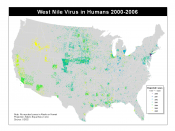After reading The Coming Anarchy by Robert D. Kaplan and asked to decide which of the issues facing the West Africans would affect the United States the most, many issues swarm through my head. Deforestation, crime, desertification, and polygamy just to name a few. But the diseases that constantly plague third world countries, such as Rwanda, Uganda, and Sierra Leone, seems to me to be the most devastating issue and will have the most impact upon the United States in the near future.
Foreign diseases are one of the greatest threats to humanity. The United States and other countries tend to easily overlook diseases and epidemics and underestimate the power of such diseases. These countries do not realize that many other problems humanity faces can easily initiate an epidemic and most of which are currently occurring in West Africa. These problems include poverty, poor sanitation, the overuse of antibiotics, mutations in microbes, increased travel, high population growth, and a change in human activities.
The means by which these exotic diseases are going to infect the United States is more than likely through a change in human activities, such as an increase in travel without proper precautions, and through the shipments of resources and animals for experimental use.
The likelihood of an epidemic occurring tends to increases as travel increases. People can control where they travel and take the necessary precautions before doing so, but what about the insects that can be easily transmitted from region to region through human traveling? The American "Screw worm fly", which spreads deadly maggots often infecting and kill livestock, turned up in Libya in 1988. If these disease-spreading insects are not controlled and kept at bay, they can quite easily surge, resulting in an epidemic. Also consider the West Nile Virus, which was first discovered in Uganda in 1937. The virus spread to the United States from West Africa by mosquitoes. Last year alone this virus killed two-hundred and eighty people in the United States. Between 1985 and 1992 several outbreaks of mosquito-borne illnesses occurred in the certain areas of the United States, such as St. Louis, Florida, and Texas. These outbreaks caused widespread panic, and forced the cancellations of many outdoor activities at night. This just goes to show how these seemingly third world diseases directly affect the United States and how easily they can be transmitted.
But on the whole, as malaria, African trypanosomiasis, lymphatic filariasis, hookworm and leishmaniasis occur in these third world countries, there has been little interest in developing treatments or cures against these diseases. It is difficult for large pharmaceutical companies to convince their shareholders to finance the development of such treatments without it affecting their success in the highly competitive and unforgiving markets closer to home. In a few cases, drug companies have donated drugs that were originally developed for veterinary use when it became apparent that they were effective against Third World diseases. There have been several proposals by the Center of Disease Control and the World Health Organization to upgrade all laboratories and medical systems worldwide, specifically in these third world countries but the United States continuously rejects such suggestions. The United States government feels that we cannot afford to carry out these proposals. The United States lacks the ability to persuade major pharmaceutical companies to produce such treatments. The pharmaceutical companies are intimidated by the lawlessness of the third world countries and feel that sending their patented drugs to this area to be too risky. The drugs may be reproduced by other undeveloped pharmaceutical companies and sold for less, which threatens the existence of the major pharmaceutical companies. These companies are also afraid that if they send their treatments to such countries they will be taken improperly and become ineffective in treating the disease in which they were designed to treat. This would in turn make their patent meaningless. It is evident why such major pharmaceutical companies with the means of helping to treat these diseases are so reluctant to do so.
When one stops to ponder this though a better, more significant question arises. Can we afford not to invest in a program that could be a determining factor in own survival? The fact is that most of these diseases lead to instant death and/or long-term suffering before death; most of these viruses are not affected by the use of antibiotics and are prone to mutate often forming new viruses. Therefore creating a vaccine is nearly impossible. In the next century, I feel that the most imminent threat to humanity and the United States is disease, especially ones originating from West Africa. As people continue to neglect the fact that these foreign diseases are extremely deadly, the microorganisms gain a greater advantage. If the United States and the rest of the world do not start to take these diseases more seriously then the fate of humanity is at stake.





